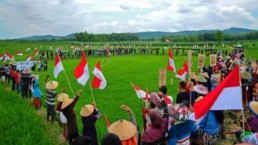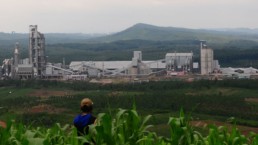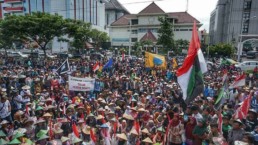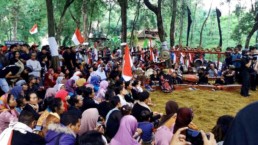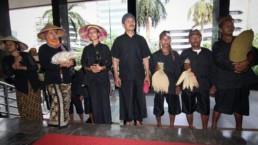Sedulur Kendeng:Voicing for Life!
Project “Sedulur Kendeng: Voicing for Life!” supported by Voice-Hivos and conducted in cooperation with LBH Semarang, JMPPK (Save Kendeng People Network), and various community networks, experts, and public figures who support the Sedulur Kendeng’s struggle. This project is aimed to ensure the fulfillment of community rights to access the productive resources such as land, water, environment, and other resources as their livelihood.
This program offers 2 main approaches: (1) evidence based-policy advocacy through multi-stakeholder dialogue, in encouraging regional spatial policy and regional development planning that accommodates local wisdom and the principal of sustainable development; (2) Enhancing and developing the capacity of indigenous peoples and women to be able and empowered in advocating their rights through advocacy and policy monitoring.
These approaches are critical, consider that the expansion of extractive mining industries (karst) and cement are legalized under the various policies, loopholes, and discretions, especially at the provincial level, with tendency ignore the community rights. Meanwhile, the capacity and bargaining power of the people tend to be weakened, even though the local wisdom of indigenous people and women in caring the “mother earth” is believed and proven hereditary to protect nature from damage and calamity.
This program emphasized the collaborative method to reach its goal. This program is done with involving indigenous peoples and women to participate actively and monitor the policy-making process that potentially harmed the Kendeng Mountains Area. The mountains are believed groundwater basins (CAT) as a source of spring that supports the fertility of agriculture, as a foundation and source for their livelihood. Community participation will be facilitated through the establishment of a Multi-Stakeholder Forum (MSF) consisting of various key stakeholders, communities, policy makers, academics, and even economic and other development actors.
In line with this, this program facilitates the capacity and knowledge building for the indigenous and women, especially in policy advocacy and monitoring. Likewise, knowledge management and sharing of experience are developed through story documentation, photo publication, and social media campaigns, and citizen journalism. Various arts creativity also open to developed through cultural festivals, art performances, filmmaking, etc.
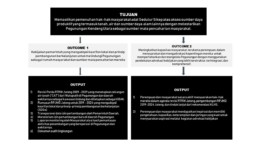
Outcome
The expected outcome from this project is the policy that adopts local wisdom and the principles of sustainable development, to protect Kendeng Mountains as ‘mother earth,’ people’s home, and source of their livelihood. This is achieved through community and stakeholders involved in advocating regional spatial planning in line with the Strategic Environmental Assessment of Kendeng Mountains; actively engaged in providing input and proposing programs in Regional Medium-Term Development Plan (RPJMD) 2019-2024, to accommodate the local wisdom and sustainable development principles; encourage opened in mining license governance and support the moratorium for new mining license in the Kendeng mountains; and conducting environmental monitoring and audit by the community.
Apart from the policy side, this project’s outcome also increase the capacity of the community, especially women and Sedulur Sikep (as part of Samin) in advocating and voicing their interests and rights in accessing the productive natural resources around Kendeng Mountains, through active and critical engagement in the policymaking process, that participative, transparent, and accountable.
Target and Beneficiaries
Since the last decade, Sedulur Sikep community who live around the Kendeng Mountains have united and organized themselves in rejecting the mining and cement industry that flourished that time. Sedulur Sikep and community around the Kendeng Mountains consistently maintain these mountains from the threat of karst exploitation that ecological harm. Sedulur Sikep believes that Kendeng Mountains are a gift ad inheritance that must be preserved. They think that ‘mother earth’ has given, that’s why mother earth must be protected. If the mother earth is hurt, then she will judge or give sanctions and impacts.
Kendeng Mountains are a vital landscape that supports people’s lives in some districts in Central Java, such as Pati, Rembang, and Grobogan. The spring which located in Kendeng Mountains is a water source for 8000 households, 4000 hectares of paddy fields in Sukolilo, District of Pati. This mountains also supply water for household need and agriculture covering the area of 15.873,9 hectares in Sukolilo, and 9.063,23 hectares in Kayen, District of Pati. Besides, 5.512 people depend on the forest resources in those mountains. Mining activities will disrupt the ecosystem of the Kendeng Mountains which will eliminate the carbon absorption function (JMPPK and SCA, 2013).
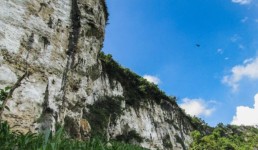
The history of Sedulur Sikep’s struggle to defend the Kendeng Mountains has been going for a long time, starting from efforts to dialogue, litigation to the number of demonstrations in front of the state palace. These actions culminated with the cancellation of environmental permit and mining permit of PT Semen Indonesia in 2016. The community also has urged the government to conduct a Strategic Environmental Assessment (KLHS) of the Kedeng Mountains which then approved by President Joko Widodo at that time.
After completion, the main recommendations from the SEA include: (1) Recommend Watuputih Groundwater Basin (CAT) in Kendeng Mountains as a protected area through the establishment of the Karst Landscape Area (KBAK) and free from mining activities; (2) Recommend conduct a revision to the Policies, Plans, and Programs (PPP), Rembang Regency Regional Spatial Plan, Central Java Regional Spatial Plan, and National Spatial Plan, by prioritizing openness and participation principles; (3) Recommend to improve the Rembang Regional Spatial Plan so the carrying capacity of the environment is not exceeded; (4) Recommend that during the process of establishing Watuputih Groundwater Basin and its surrounding as the protected area (KBAK), it is prohibited to conduct mining activities because it will disrupt the aquifer system (underground layer containing water and can drain water) and damage the carrying capacity of Watuputih Groundwater Basin’s environment.
